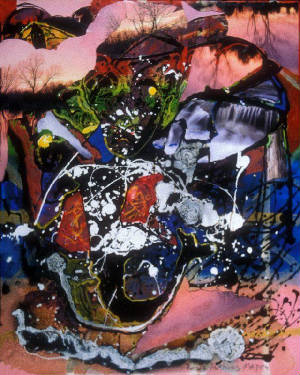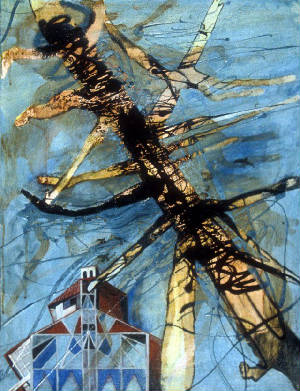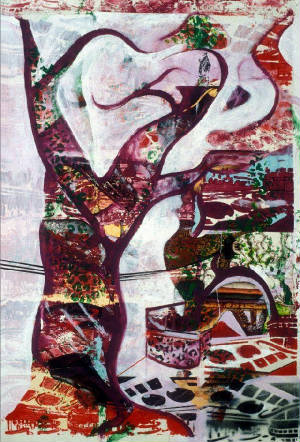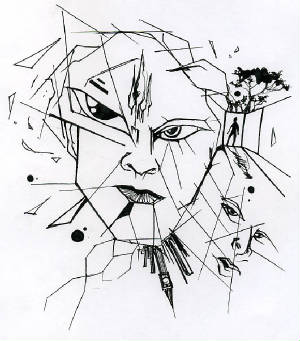 |

|
2 Poems by Don
Pomerantz
Names of the Dead
This
week, only their names are dead
so that now, the officers no longer
are able to call them into combat.
Their names,
written on parchment papers
are cremated by their brothers in arms with full honors,
the ashes drift up to the Name
of Heaven
as the soldiers, anonymous, at first march
then walk, platoon after platoon,
weapons discarded, down to
the river
the ships are there waiting to ferry
them out to sea, to the unknown islands,
also lacking names.
The
trip is long, but the oceans hum.
They make landfall in the night, the driftwood and shells
offer no resistance and
the beach is easily taken.
They make camp at the top of the sands
play cards, drink beer, smoke cigars,
smiling,
barefoot, nodding to one another,
unable to speak, nameless,
and, with the many names of war and of death
purged
from their blood, serene.
In Brooklyn
A
busboy without English
Conducts his martial arts exercise
With a corkscrew, by the soft-tinted
Windows of an Asian
Fusion restaurant
In the lingering suns of late afternoon,
The settings before the setting
Which duel, pull and dance
With
the sun in the mind
Of his rising mind embracing
The sun as it dances, and dances off
The black and silver corkscrew
he twirls
To open the bottles of quiet light
Which open and spill out across his hands
As he lays the corkscrew
on a table,
Spill onto his hands now gripping
The flanks of a red leather chair
Which he grasps like a new lover's
hips
As he watches them spill onto a graybearded man
Crossing the avenue on crutches,
Whose eyes are the eyes of
veterans left alive,
Who grips his crutches like the hips of a lover
Lost a long time ago, remembering possibility
And
the sun rising over the jagged, brief peaks of Asia.
| |

|
|
2 Poems by Mark Jackley
Man Eating a Burrito, Waiting for the Movie to
Start
He bows his head in the church-like stillness,
tenderly
regarding
the miracle of chicken, rice and beans.
When a God-like voice booms
from the screen, he,
slowly
licking his fingers,
rebel without a napkin,
commits the heresy
of being filled already
with happiness.
He
burps,
ignores the coming attractions.
'Round Midnight
The
whoosh of the air conditioner
brings to mind Ben Webster's
horn as Billie moans. I adore my wife, thank God
she is
asleep at last.
I curl up with a book. My father,
thirty years ago, pours his last martini,
clutches "The Lonely
Silver Rain"
by John D. McDonald.
In a quiet corner
of Des Moines my father's father
closes his eyes to the Great
Depression,
blows on his trombone,
for even white men get the blues,
it is something that we love.
| |

Hallelujah! by Jeanpaul
Ferro
Looking beyond the porch, the rain slowly
traveling down the claim shell road,
darkening
skies, where whiteness used to be;
the houses along the road screaming of your death,
the blue one, the maroon one,
the melancholy yellow,
one liked music; one liked what a picture could be;
your small ghost running across their lawns;
Hallelujah!
they’ve told me that you’ve gone;
the two men who came up in the black sedan,
stood there politely on the
steps like soldiers,
told me about a war that was far away;
and they said that rain makes all material dissolve,
it
washes away the mind and everything ideal,
makes the fields slowly turn green with spring,
changes what you are/what
I was always holding
onto.
|
|
Near a Pond Near a Path by Ray
Succre
His hair was wild in the back,
did not lay flat or lick,
but intertwined, stuck in rummy curls
like briar thrush down foothills.
Her teeth were original teeth.
She'd seen no other set like them.
He had a large, snout of a nose,
a tow-hitch beak that overshadowed
his face like a sundial.
Her mirrors played in the locks,
built empires out of her stare,
brothels of all else.
He was a twelve year old,
deformed from birth,
and was pointing at the slide.
She was allowed seventy years,
and then seventy one,
and then her years had made
a great grandson.
They sat in the sand
by the swings by a slide.
Neither had acquired
bread to feed the geese,
this morning. | |

|
|
God's Soldiers
short fiction from Richard Paul
Klein
The sulfur is strong and sharp; it burns my eyes, my throat,
my nose. I cannot smell the blood, but I can smell sweat. I hear the screaming, the crying, the inaudible words of the worst
possible sorrow. I believe I hear fear, the agonizing sound of a grown man whimpering behind hands that cover his thick
grey beard. I heard the same sound from an animal, a dog tied and beat. The scream, a grief filled sob, rips at what binds
it only to find futility in escape.
This is a black night. A shadow descends over the land. Mercy
or God is turning a blind eye. They have been rounded up. Women with their hair grasped in the fists of God's soldiers have
been dragged into the dusty streets, and in the sight of their own children, the men, fathers, were beaten at great leisure.
His frock—there has never been a thing more pure more
white. He glows brighter than the lamp. I do not know what he says; I am not listening. I cannot. I could not understand if
I wanted too.
He is on his knees. They are all on their knees. Their hands
cover their faces; their bodies limply avoid the stare of the guns. But he stands. Everything about his body is solid. His
fingers are so thick and calloused, yet so clean. They are spread out. His palms raised into the air. He proclaims the
light of his sermon to the land.
My hands cannot compare. They are not powerful; they are
not clean. He is a brown man, hair black like the night sky. He is the salt of this earth, that strong race that farmed the
land, laid the bricks, built the homes, and the schools. He is pure, kneeling in the blood willing to draw the initial ire
of the rifles, while the lesser cower behind him, a man willing to spare a sheltered fellow one more moment's breathe while
he falls lifelessly to the ground.
My gun is warm. I can see the sheen of my barrel by the lamp's
glow. Blood flows down hill steps away from my boots. I see it as plain as I see him, the man. A shoulder presses close to
mine. My brethren shakes. His grip is loose. He is tired, and afraid. His hand stretches out; he holds still the barrel of
his rifle, barely. Days marching and nights killing, my legs are tight. My boots press deep into the dirt. I fear the spreading
blood will reach them. I will lose my foothold. My aim will suffer. The weight of my supplies and garments has never been
heavier. My finger, moist, slides down the curve of the steal trigger. I hear the command. The voice is strong—and now—I
hear only gunfire. | |
|
|
In the Silent Hours
short fiction from Bill West
It was in the dark of night, when others
slept, that he did it. They looked so pure, so innocent, he thought; black and crisp against the smooth white.
He would hunt them, singly or in groups.
He didn’t much care where he found them. They were his to take. He would put them to his own use, twist and deform them
till they did his bidding.
But later, in the silent hours, voices
came. Ghost marionettes, grey mouthed, arms outstretched, tongues licking up his words; words to speak, words to make them
live. They didn’t share his passion, the actions of verbs on nouns. They wanted words as flesh, words to shape them.
He tried to resist, thinking of shorter
and shorter words, like nubbin or pin. The struggle was intense. Characters raged in a vacuum, motiveless and faceless, shredding
like clouds in rain. He starved them and tamed them, choked them with fragments, and checked them with punctuation, with commas
and the full-stop. | |

|
How Could You? short
fiction from Jim Harrington
"My father warned me not
to marry you.”
Amos, red-faced and shaking,
folded the lace slip and threw it in the water-stained box.
“He told me you'd
break my heart.”
“Your father was an
old fool. You said so yourself.”
Her calm voice didn't have
it's usual effect on him. Amos peered over his bifocals at Gertrude. She wasn't the svelte seventeen-year-old he'd married,
but that didn't matter anymore.
“Well, maybe I should
have listened to him."
Gertrude didn't respond,
as was often the case these past three months. Amos removed the blue chiffon dress she'd worn on their first date from its
hanger, laid it on the bed and crossed its arms over the bodice. He liked this one, but it wasn't his favorite. She sat in
the rocking chair in the corner wearing that one, the white dress with the purple and rose pattern that snaked from shoulders
to hem. His eyes embraced her body. Even now, her beauty created an ache in his loins.
“Why do you always
smile when we have an argument?”
He thrust the dress on top
of the slip.
“Because I know how
it's going to end.”
A spate of machine-gun laughter
erupted from her mouth.
“Damn it, Gert.”
His chest rose and fell, rose and fell, rose and fell, as he calmed himself. Gertrude remained stoic.
“You know you're the
only woman I ever loved. Never even thought about being with anyone else after I met you.”
A pair of slacks, as blue
as his mood, followed.
“But you knew that
didn't you, right from the start. You were the smarter one."
He moved the box to the
floor and put its mate on the bed. He packed in silence and listened to the creaking of the rocking chair as Gertrude watched
him, nodding when he folded an item right, raising an eyebrow when he didn't.
“I still can't believe
you did this. It happened so fast.”
He massaged his temples
to ease the pain.
“You didn't give me
time to prepare. After fifty-five years you still don't get that I don't like surprises. It's not the way I run my life. I
need order and consistency. No surprises. You know that."
Tears flooded his eyes,
sobs ravaged his body. He fell to his knees and buried his face in the comforter. The words crept from his mouth in alternate
waves with his moans.
“I need you, Gert.
What am I going to do without you?”
She didn't respond. He cried
until there were no more tears to shed. His body ached from the storm that had raged through it. He looked at the chair. She
was gone. He finished putting the last of her clothes in boxes and carried the first downstairs, a final tear zig-zagged down
his wrinkled cheek.
He was behind schedule.
The Goodwill truck would be there in twenty minutes |
|
|
Winning Changes Everything fiction from Robert McGuill
He checks the rearview, lets his bad eye linger a moment on the side-by-side .12 gauge in the rifle rack, then grips the wheel
and stomps the accelerator with his muddy boot.
What goes through his head as the truck rumbles
down the road with a tongue of dust in tow isn’t the hiding he took out on that country road last night, or the havoc
he intends to wreak on the pidgeonhearted bastards who’d jumped him, but his girl, Jorie Rogers, who’d set him
up for the beating with all of her toxic, blue-eyed lies.
He’d never struck a woman before--didn’t
even know such a thing was in him--but after the first slap, the rest came easy. One, two, three—slap, slap, slap—just
like that. He was surprised how right it felt, how good it sat with him while he was doing it, and he let her have it
once for every time she’d stepped out on him with Pete Wexler.
He feeds the truck more gas.
The church steeple inches up out of the trees on the hillside, puncturing the clouds. It’s followed by the gradual
rise of brick buildings and houses, and finally, streets so narrow they could choke a man.
He takes
the back roads so he won’t be seen, angles into town by way of garbage-strewn alleys. A block away from the restaurant
he parks the truck, and after a cautious look around, reaches for the shotgun and slips out the door.
He carries the gun in the open, tucked under his arm as if he’s on his way to the smith to have it retooled. The
sight isn’t all that uncommon owing to bird season, and folks nod as he walks past, some smiling and giving him a quiet
hello, only a few doing a doubletake when they catch a good look at the bruises on his face.
He makes
no attempt to conceal the weapon until he gets to the restaurant.
Then, just outside the door, he lowers
the thing next to his leg.
“That’s bullshit,” Pete Wexler says, dropping his
fork on the thick china plate and propping his elbows on the table. “He never knocked me down. He got in
one lucky punch was all.”
Les Granger raises his cup and snorts, working at his stained teeth
with the end of his tongue. “That ain’t what I heard. I heard you got your ass kicked. Four
against one, and you got your ass kicked.”
The two men from the DeKalb grain
store who are sitting on either side of Granger, snicker as the thick-necked welder rides the younger man.
“Who told you that?” Wexler demands, leaning into the table, combing back his long hair with his fingers.
“I’ll settle his hash too.” He taps Johnny Heffemeyer on the arm with the back of his hand.
“Tell em how it happened,
Heffemeyer lowers his head and fiddles with the saltshaker. Wexler
ignores him saying, “Well, it don’t matter much what you heard, cause I can tell you this, he won’t be showin
his face around here any too soon. Not with the tattoos we put on it.”
The feed store clerks
glance at one another. Les Granger grunts, scratching at his hardscrabble beard, and returns to his food.
“Why don’t you just shut your yap about it for a while,” Johnny Heffemeyer says, tugging on his dirty ball
cap.
Wexler looks at him. “What’s eatin you?”
“Nothin.”
“He got what was comin to him, didn’t he?”
“I guess.”
“Then why the hell not say so?”
Les Granger
looks up from his scrambled eggs and sausage. He eyes his coffee cup with a sad expression. Some people, he says,
stifling a burp with his hairy fist, need to be accounted for in different ways than other folks. You got your regular
people, he says, and then you got your losers, and the losers you can’t do nothin for because, if you could, they wouldn’t
be losers. He folds his hands. Ends the parboiled sermon with a raised eyebrow and a nod of the head. Then
he tweaks a pack of Lucky’s from the bib of his overalls, shakes one loose and lights up, flicking the spent match in
the ashtray.
“Gage Steggers ain’t no loser,” Johnny Heffemeyer says, staring a hole
in the table. He spins the saltshaker with his fingers. “She did him first, goin' behind his back, cheatin
on him like that.”
The others fix on him.
“Havin regrets are
you, son?” Les Granger asks.
“Maybe, one or two.”
“Well,
get over em. The man walloped a defenseless female.”
“Defenseless?” Heffemeyer
passes a glance at Wexler, then looks back at Granger. “Jorie Rogers?”
Granger considers
the remark. Shrugs. “You know what I mean.”
“Yeah, sure. I know
what you mean.”
“Hey, Les,” Pete Wexler says, all chummy and smiling, raising his
chin.
“Bum me a smoke, will you?”
The welder eyes the young
mechanic contemptuously, but remits. Pulling out a cigarette, he tosses it to Wexler in a tumbling arc over Johnny Heffemeyer’s
ball cap. As he’s doing this he spies Gage entering the restaurant, the shotgun pressed against his leg.
The cafe goes as dead as a graveyard when Gage raises the weapon. Heads turn. Nobody speaks. On the far
side of the room a pair of old timers in lace-up boots and plaid hunting jackets rise from their seats and shuffle past him
out the door with their heads down.
The scrawny farm boy appears almost comic, scarecrowlike, with his
black, swollen eye, the stained piece of tissue just above it marking his brow with a brown smear, a crust. But he doesn’t
smile, and when they see him, no one else smiles either.
He takes a step forward and raises the gun
barrels, resting them in the crook of his arm. Throwing a glance Pete Wexler’s way, he says, “Am I late
for breakfast?”
The men sit stone-faced at the long table. Then Les Granger pulls the cigarette
from his bottom lip, glares at the site, and mutters, “What the fuck is this?”
Gage bears
down on them with knotted eyes. “I’ll tell you what it is,” he growls, moving the gun into both hands
and widening his stance. “It’s time to pay up.”
One of the clerks from the DeKalb
feed store--the big, dark man they called Copey, pushes at his steel rim glasses--begins to rise, sheepishly, as if he’s
just realized he’s late for an appointment. “I gotta be openin the store,” he says to no one in particular.
“I—“
Gage hoists the shotgun to his shoulder, leveling the barrels square over the
table. Says in a hard, flat voice, “Sit down, tubby.”
The rotund man breathes out,
his breath seeming to fill up the entire silence of the restaurant, and he slips back down, edgewise, onto his chair.
At the back of the room the service doors swing open in a squeaking clatter of wood and metal, and the owner, Nick Spfikos,
who’s been helping the cook with the early morning orders, walks out wiping his hands on a dingy towel.
When he sees Gage standing at
the other side of the room brandishing the gun, he hitches up in an attitude that runs something between surprise and agitation
and, looking around, demands, “What’s goin on here?”
“Stay where you are,”
Gage says. “This here doesn’t have nothin to do with you.”
Nick’s hands
work the towel. He looks down at his fingers then tosses the soiled cloth on the countertop behind him, next to the
Bunn coffee makers.
“We don’t need no trouble,
here,” he says, his eyes working back and forth between Gage and the boys at the table as if trying to figure out what
it is that’s brought them to this moment.
“Too late for that,” Gage tells him.
The men sit motionless. Like a
painting.
“You,” Nick Spfikos says quietly, looking at the bruises on Gage’s face
and matching them up with the swollen knuckles of Pete Wexler’s right hand, “Put down the gun, okay? Whatever
point you tryin to make, you done it.”
Gage turns a quick glance on the little
Greek then throws his eyes back to the table. “Not yet, I haven’t.”
Nuzzling
his gaunt cheek to the cold, wooden comb, he draws a bead, and before another word can be uttered, slaps the trigger with
his finger, tripping both barrels.
In the long moment between the doing
and the seeing it done, he watches with grim satisfaction the faces of his victims as they twist into frozen portraits of
terror.
Les Granger is wincing, his stubbled face canted slightly to the left, his cigarette clenched
in his teeth. Johnny Heffemeyer has turned full away in an exaggerated flinch, eyes pinched shut, his right elbow raised
before his face as if he’s braving a sleet storm, and Pete Wexler, the silliest looking of them all, is caught wide-eyed,
mouth agape, his chipped teeth visible to the world, his boyish face a bottomless well of fear.
The
firing pins snap, CLICK, CLICK, and the men recoil from the expected volley. But the chambers are empty so no one falls.
They blink, breathe out, search their hands and arms for signs of blood and, finding none, lock their eyes upon the
would-be gunman.
Gage relaxes his stance. Says, as he looks across his shoulder to Nick Spfikos,
“There. Now I made my point.”
Pete Wexler is the first to leap up,
uncoiling from his chair. His face is flushed, blood-red and crazy. “You sonofabitch!” he screams,
“You’re dead!”
Gage regards him lightly. Lowers
the shotgun and clasps it by the barrels, hinging it down so it dangles from his swollen hand like a toy.
“Get him!” Les Granger yells.
A storm of shouts goes up, and they
come at him like madmen, upturning plates and glasses, knocking silverware helter-skelter across the tile floor. But
before the first of them can lay so much as a hand on him, Gage throws over a table, blocking their path, and comes around
hard with the butt of the gun, swinging it like a baseball bat. It catches Pete Wexler flush on the jaw with an unnatural-sounding
crack, and the hot-headed mechanic crumbles to the floor.
Les Granger, who played no part in last night’s
doings but has it in for Gage just the same, comes forward next, his eyes thirsty to see the cuts on the farm boy’s
face reopened. Groping around, he snatches a coffee cup and heaves it, but Gage ducks the missile and squares his shoulders.
Granger isn’t finished. He piles forward with a raised chair, his green eyes wide as saucers, and in one quick
motion Gage brings him to his knees, retching, catching him in the bread basket with a heavy, thudding blow.
When the others see the burly welder go down they fall back, panting, each looking to the other to see who’ll make the
next move.
“Get out!” Nick Spfikos, hollers, standing at the periphery of the fray.
“Get the hell outta my restaurant. All a you! Now!”
Gage
keeps his eyes locked on Johnny Heffemeyer, figuring he’ll be the next to come since he’s already had a taste
of blood and no doubt found it agreeable.
But Heffemeyer doesn’t budge. “Go
on home,” he says, loosening his hold on the flatware knife in his hand. “It’s over. You won.”
Gage inches back, warily. Feels the sun coming through the plate glass window, warm and soothing on his neck.
Tender, the way Jorie Rogers’s breath used to feel when they’d dance slow and she’d close her eyes and cling
to him like there was no tomorrow. Won? He steals a glimpse of his reflection in a backboard mirror near the coat
rack. A man he doesn’t recognize looks back at him. Trembling, blinded by tears, he raises the shotgun higher,
poised to strike the next blow.
| |
Enter supporting content here
|
|
CONTRIBUTORS:
George Bishop
was born in Philadelphia, lived on the Jersey shore, and attended Rutgers University where he studied English/Creative
Writing. He relocated to Florida in 1985. Recent work has appeared in California Quarterly, White Pelican Review and
is forthcoming in The Comstock Review.
Mike Blake lives
in RI and is just finishing up a novel length project started this past winter. He has writing online at: Skive; 3711 Atlantic;
Cerebral Catalyst; Zygote In My Coffee; Exposed; Stick Your Neck Out; Hackwriters; Fiction on the Web.
Don Pomerantz lives
in New York City where he teaches special education. His poems have appeared in Common Ground Review and Houston Literary
Review.
Mark Jackley
Jeanpaul Ferro
is a poet, short fiction author, and novelist from Providence, Rhode Island. Hiswork has been featured in Cortland Review,
Hawaii Review, Identity Theory, Pedestal Magazine, Portland Monthly, Barrelhouse Magazine, Arts & Understanding Magazine,
and others. He is a 4-time Pushcart Prize nominee and his work has been featured on WBAR radio in NYC.
Ray Succre
currently lives on the southern Oregon
coast with his wife and baby son. He has been published in Nthposition, Small Spiral Notebook, and Rock Salt Plum, as well as
in numerous others across as many countries.
Richard Paul Klein lives in Minnesota with his two dogs Stanley and Rocky.
He teaches English Composition at a small state school. His fiction and non-fiction have been published a
number of times both in print and online. His most recent publication was in Wandering Army.
Bill West lives in a small house on a small hill in Shropshire,
UK. He shares his life with his journalist wife, two sons and a cat with
three legs. He is a member of the Bridgenorth Writers' Group, I*D Writers' Group, The Shrewsbury
Scribblers and a number of on-line writers' communities. His work has appeared in
FlashQuake, Mytholog, Heavy Glow, Right Hand Pointing, 21 Stars Review,
Foliate Oak, The Boston Literary Magazine and others.
Jim Harrington
Robert
McGuill has short fiction that has appeared, or will soon appear, in pacificReview, the South Dakota
Review, Talking River, The Baltimore Review, The Emerson Review and other literary publications. In 2004, his story,
“Heaven Help Me, Uncle Jerry,” was nominated for a Pushcart Prize.
Roger
Anthony Mapes "My vision is an abstract expressionist/surrealistic/sci-fi way of painting dreamscapes on canvas
using acrylic paint, house paint, found objects, and assorted other media. I interpret energies from spiritual, supernatural,
and otherworldly forces. I read a lot of sci-fi authors such as Frank Herbert, Octavia Butler, and Vernor Vinge. I am also
very interested in the channeled writings of SETH. These ideas and characters from novels and readings show up in my paintings
as powerful and sometimes disturbing images in saturated, mostly primary, colors."
Jeff Crouch
Karim
Hetherington is a 27 year-old writer and illustrator who studied for a 3 year illustration and design
BA at Wolverhampton University. Among his favorite artists are Martin Johnson Heade, Freidrich, John Kacere and Paul
Signac. He also enjoys writing and illustrating Graphic Novels and short stories, creating cover illustrations
for magazines, and doing freelance work.
Home | |
|
